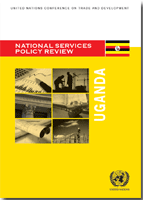
The services sector in Uganda is now the largest sector in the economy. The aggregate contribution of services toGDP in 2008/09 was 51.2 percent with a growth rate of 9.4 percent, faster than the growth rates in the agricultureand industrial sectors for the same year. The Uganda NSPR focused on four future growth areas within theservices sector, namely professional, insurance, accountancy and construction services.
In conducting the NSPR a national team of experts, with technical assistance from UNCTAD, engaged with abroad group of stakeholders from government, industry, academia and civil society to identify challenges andopportunities in the abovementioned services. The UNCTAD team worked closely with Cyprian Batala, AssistantCommissioner, External Trade, Laurean Bategana, from the Ministry of Tourism, Trade and Industry, Dr. FrancisMangeni, Director of Trade, Customs and Monetary Affairs at the Secretariat of the Common Market for Easternand Southern Africa, George Walusimbi-Mpanga, who formed the national team, and His Excellency AmbassadorArsene Balihuta and Mr. Elly Kamahungye, both of whom at the time were with the Permanent Mission of Ugandato the UN offices in Geneva. The review process included an analysis of the current policy framework forprofessional, insurance, accountancy and construction services; regulatory and institutional challenges inhibitingsectoral development; national development objectives; prospective policy options to strengthen domestic supplycapacity and SMEs competitiveness; and the potential impacts of services and services trade liberalization onsectoral FDI, SMEs, efficiency, employment, access to foreign markets and universal access to basic services.
The resulting wide-ranging but concrete recommendations from the NSPR are set out in detail in the body of thisreport and include proposed measures to enhance the contributions of the professional, insurance, accountancyand construction services to Uganda’s economy. In the professional services sector recommendations to leverageUganda’s large pool of medium and high skill workers and enhance professional services exports in the EastAfrica Community was stressed. In the accountancy services sector the need for legislative reform to grant alegal mandate to the Institute of Certified Public Accountants of Uganda as a means of increasing professionaland ethical compliance was highlighted. In the insurance sector, the need for the proposed mandatory NationalHealth Insurance Scheme to provide medical insurance cover to the majority of the Ugandan population, largelyin the informal sector was considered important as was the need to create a body charged with the duty to adviseGovernment on appropriate risk management policies. In the construction services sector, stakeholders were ofthe view that updating and adopting the draft National Construction Industry Policy would be key in addressing alarge number of policy, regulatory, institutional and capacity gaps.
I hope that the contents of this publication will contribute to providing a strategic vision for the development ofUganda’s services sector, and assist the country to continue to derive development benefits from trade in services.



